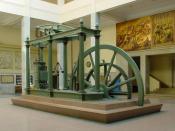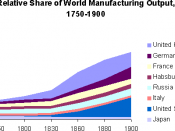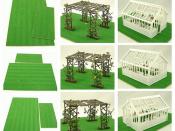The Industrial Revolution has had a tremendous impact on the whole world. But because of its British origin the people living on the island bore most of the hardships and went through the quickest and most radical change out off all the people affected by this movement. The beginning of the movement can be traced to 1750 and continued through to about 1870. Although Britain was the epicenter of this change not many countries were unaffected by this. It may be argued that the reason the Industrial Revolution spanned a period of 120 years was due to it transforming a large-scale culture as opposed to a quicker change in a small-scale 'Arembepe' like culture. Subsequent to the revolution, agricultural growth took a backseat to technological innovations and mass production. Society changed in a very short time from an agrarian and relatively self-sufficient society to an industrial and consumption driven one.
As a result, this gave rise to Capitalism, as well as, Marxism because a revolution of this sort pitted the people with little access to resources against the wealthy factory managers and owners. Associated with this progress is also religion, which played an integral part in the shaping of the revolution and its progress. The industrial revolution forever changed the face of the modern world. The modernization and change that was brought upon by this revolution improved lives and at the same time disregarded the basic principles of humane treatment. All of this was achieved with the blood and sweat of the British factory laborer in the 18th and 19th century.
Prior to the Industrial Revolution Britain experienced a boom from colonial entrepreneurship. Britain was at the forefront of colonial discovery helped by advances in marine architecture and navigation. Sociopolitical organization was stratified and Britain was still mostly an agrarian...


